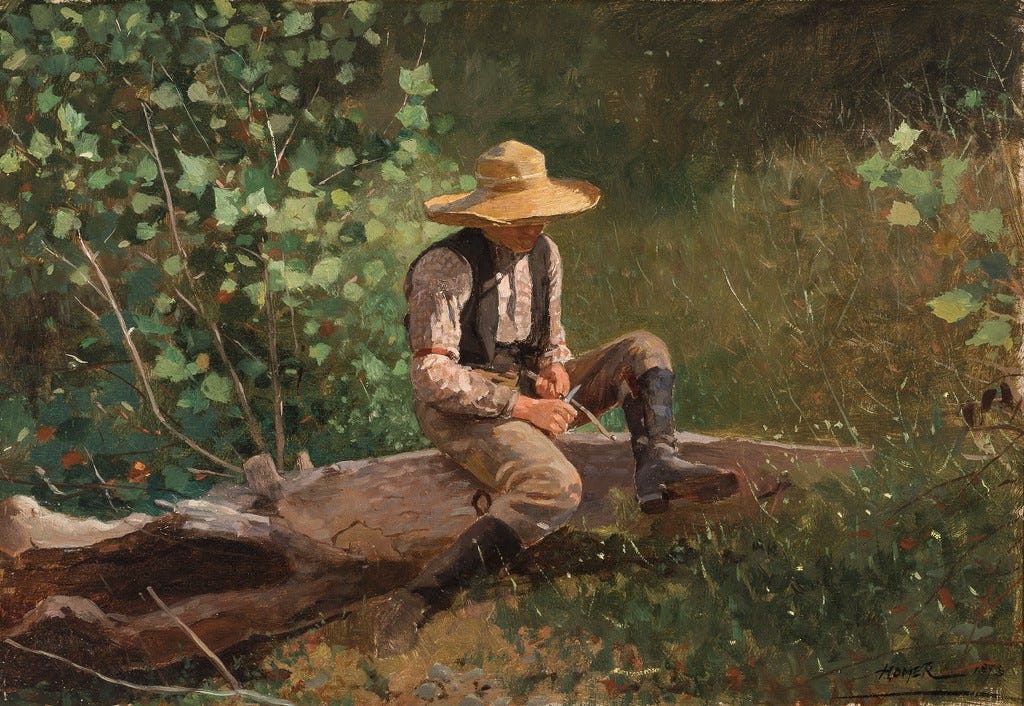This is a follow-up post to Sowing Anachronism: How to be Weird in Public, and Private.
For those of you who prefer to read off paper rather than the screen, we have converted the post into an easily printable pdf file. Remember to come back and share your thoughts and comments! You can access the file here:
You can download a list-only version (with space to take notes) of the “Seed Catalogue” here:
Saruman believes that it is only great power that can hold evil in check. But that is not what I found. I found it is the small things, everyday deeds of ordinary folk, that keeps the darkness at bay. Simple acts of kindness and love.
- Gandalf, The Hobbit Film
The winter solstice is upon us, a time of deepest darkness, but also a time of rebirth. Today’s post is fitting for the season, as it’s a catalogue of seeds we can plant, through ordinary acts, that can grow into something real and hopeful in a world struggling with its own dark solstice.
We had a tremendous response to our request for readers to contribute their anachronistic practices. There were many that were named numerous times including: reading physical books, walking, biking, baking bread, keeping a journal, and using dumbphones. There were also some practices which seemed quite obscure, such as using a scythe instead of a lawnmower (two readers) or, incredibly, living without a fridge (also two readers).
One thread that carried through many responses was thankfulness for the encouragement to continue to swim against the digital deluge, regardless of how weird or anachronistic it may appear:
“…because after reading that piece I felt more at home in the world, un-conformed as I am to it…Peco and Ruth’s post, has cheered me up immensely”
“Inspiring! I want to approach my hopes and prayers for the new year with these marvelous thoughts in mind.”
“Thank you for always turning my mind and heart toward the actions and attitudes I KNOW are better, yet forget or eschew.”
The comments amounted to over 40 printed pages, which I (Ruth) reviewed carefully, checking off each named action while noting it down by hand. This is what it looked like:
Now the question remained how best to share these with readers (the work seemed surprisingly reminiscent of sorting through student data from my qualitative research for my Masters Thesis). The practices seemed to fall naturally into five overlapping, yet distinguishable categories:
Technology use (reducing, altering, removing, replacing)
Self-sufficient, minimalist practices
Embodied & mental practices
Children and family
Spiritual and relational practices
We then sorted each of the practices that readers shared into these general categories. While we would have loved to acknowledge each person who contributed a given practice, it simply was not feasible (after all it’s Christmas week and we still want to enjoy actually doing the things we keep talking about!). We encourage you to revisit the original post and savour the comment section with all the wonderfully rich descriptions and stories.
As it would have been impossible to list the anachronistic practices based on “order of importance”, we simply alphabetized each list.
Please Note: We are not suggesting that you need to follow all these practices or any of them. Use them simply as inspiration from other readers. Pick the ones that speak to you, or come up with your own.
“It isn’t important which things we do, only that we find some, that they re-embody us, enrich our shared lives, and return us to our ‘right minds’.”
Technology use (reducing, altering, removing, replacing)
One of
’s main objections to the smartphone is that it has multiple uses: “You might think this is a good thing, but hear me out. The more things that a single tool can do, the more reliant you are on that single tool, and the less resilient and resourceful you yourself become.”Allow yourself the freedom to live and be without a phone
Build in personal meetings with clients rather than online only interactions
Cycle instead of using a car to get a better sense of distance, time, and climate
Delete excess photos from your phone
Develop film yourself
Don’t link e-mail to your phone
Don’t own a TV
Get a dumb phone
Get a land line
Get a point-and-shoot camera/disconnected smartphone for taking pictures
Get a typewriter
Give up social media
Give your teens wisephones/ lightphones instead of smartphones
If using an iPad, restrict functionality (delete built-in apps, add screen time limits)
If you publish a digital magazine, provide printed copies
Keep a clock that makes audible sound (like ticking or hourly chime)
Keep a paper planner
Keep a white board calendar
Keep your living room free of a television
Leave your phone at home when you go out
Listen to music on CD or records
Live by natural time rather than clock time
Maintain a landline as stationary family phone
Make a physical photo album from a small selection of your digital photos
Purchase a print subscription to newspaper/magazine rather than digital
Reduce the number of apps on your phone
Refuse to use Amazon
Send letters to family and friends to share news and say hello instead of facebook etc.
Send voice messages to friends
Set specific hours for phone use
Spend time in tech-free spaces
Switch to a flip phone
Switch your phone to airline mode when walking
Use a film camera
Use a local ordinance survey map to walk public footpaths and countryside
Use a pocket note book as a planner instead of your phone
Use a radio in the car
Use a record player and listen to vinyl
Use a watch instead of your phone to tell time
Use an e-reader with a backlit screen (so as not to be distracted by the internet)
Use an old Polaroid to make photos
Use film for still photography
Use message apps on computer instead of smart phone to set boundaries
Use paper maps
Use paper maps when hiking or camping instead of GPS
Use portable CD players (found at thrift stores)
Use the “manual” rather than the automatic door entrance
Use Victorian-style “calling cards” to give to people to get in touch with you
Use video chat instead of texting
Watch movies on DVD
Write your grocery lists by hand instead of your phone
“…I am enjoying the weight of the camera when I take it with me and because I can’t take a handful of quick photos they end up having more significance to me. Not to mention that the photos at their core are not 0’s and 1’s but feel more tangible with how they slowly develop to a tinted image separate from the pristine image on my phone’s camera.” - Dan
Self-sufficient, Minimalist Practices
“I realized that any day when I spend time tending a fire is a very satisfying one, because it makes me feel like a Traditional Human instead of a Distracted Modern.”
Bake bread
Bake intricate pastries
Bike
Build a chicken coop
Butcher your own meat
Buy beef directly from ranchers
Buy clothes second-hand
Buy from local shops
Buy produce directly from farmers
Buy shoes that can be mended
Carpool or take transit when possible
Compost and enrich garden soil both by hand and with compost tumbler – practice “worm husbandry”
Compost everything that can be composted
Cook from scratch
Crochet
Cross-country ski to the grocery store
Cycle – even when the weather gets cooler
Cycle a gearless bike
Cycle to work
Delve into handspinning
Don’t buy processed food
Don’t use a microwave
Eat more simply
Favor small, local businesses
Forage for food
Gather your own wood for the stove
Get meat directly from farmer
Go carless
Go fishing and hunting with your children
Grind coffee beans with a hand grinder
Grind your own wheat flour
Grow your garden from seed
Grow your own flowers for hand-cut bouquets
Grow your own food
Hand-sew
Hand-water your garden
Knead bread by hand
Knit
Knit in public while waiting
Learn to preserve food by canning
Line-dry your laundry
Make bread by hand
Make cultured dairy like kefir and yoghurt
Make fermented foods like sauerkraut or sourdough
Make jam
Make wine stomped by foot, fermented in vats, and processed with muscle power
Mend or alter clothes by hand
Milk goats
Minimize amount of heat so that attire is dependent on weather
Minimize the time you use artificial light
Pay cash whenever possible
Pick mushrooms and herbs
Process your own game meat
Produce your own food supply
Raise a kitten
Sew buttons back onto clothing
Sew your own clothes
Shop at a local market instead of superstores
Shop at brick and mortar stores
Slowly increase the amount and variety of food you grow
Smoke your own bacon
Start gardening
Take buses and trains
Use a backpack to carry food from grocery store
Use a camp wagon to walk to the grocery store
Use a cold box with cold blocks
Use a compostable toilet
Use a hand grinder for coffee
Use a push-powered mower
Use a scythe instead of a lawnmower
Use a wooden stove sauna
Use a woodstove to heat your home
Use an ax instead of a chainsaw
Use drop spindle to make yarn
Use gathered sticks and leaves to fire Kelly kettle for tea
Use natural materials in the home e.g. wear cotton, linen, wool, leather, glass containers
Use stairs instead of escalators
Walk barefoot
Walk everywhere
Walk to appointments if possible
Walk to the library, the co-op, the thrift store, wherever you can
Wash and card wool
Weave
Embodied & Mental Practices
"C. S. Lewis also used a dip pen—not a fountain pen. He liked to dip the pen every 4-5 words and he would whisper his next 4-5 words aloud before writing them, to make sure they flowed. He believed it was important to make sure the words sounded right to the ear first." Nadine Brandes (comment added by Dan)
Always carry a journal with you
Build a Little Free Library
Complete a daily (ink) drawing
Craft in public
Dance in community: polka, square dance, waltz, Virginia reel
Draft all essays on paper
Draw
Exchange letters with friends
Find books to read from free book racks at recycling depots, railway stations, etc.
Give handmade gifts for Christmas
Go to the library frequently for new reading material
Hand-write and hand-address Christmas cards
Journal in a notebook
Keep a Commonplace quote book as a standard reading habit
Keep a daily journal
Learn a language (such as Argentine Spanish)by talking to everyone you can, make notes in longhand, carry a book of verbs
Learn the tango
Listen to audiobooks
Make your own birthday cards for people
Make your own Christmas wreath/ Advent calendar
Paint
Play the guitar
Play the piano
Practice an instrument
Practice creative writing with pen and pencil
Practice pottery
Print out recipes and put them in a binder
Read books during commute
Read non-fiction and novels from earlier eras
Read old books from lists such as John Senior’s 1000 Good Books ,
Johnathan Pageau’s reading list, or St.John’s College Reading list
Read physical books
Read the newspaper in the library
Read tons of books
Reread books
Roll beeswax candles
Send Christmas cards
Sing in a choir
Sing in a local production
Sing long songs from memory
Sing traditional songs in groups (unaccompanied)
Smash coloured rocks to make ancient paints
Swing dancing
Switch to a fountain pen
Switch to writing by hand
Take client notes by hand
Teach yourself bookbinding
Thrift clothing
Try needle felting
Type a page a day on a manual typewriter
Upcycle garments, making them better
Use a cookbook instead of defaulting to recipes online
Use half-used paper (whenever possible) for notes
Use pencil or ink pens
Use reeds for quill pens and scrap metal for metal point drawing
Write a novella in longhand
Write ideas for online creative projects in a notebook before typing or editing
Write in cursive
Write letters by hand in public
Children and Family
Allow children to use knives to whittle
Allow your children ample free time to pursue their own interests
Allow your kids to build stuff in the backyard
Approach home education the Charlotte Mason/ Classical way with lots of time in nature
Bring games and art supplies to share with other kids while waiting (during lessons)
Cultivate a healthy level of independent play
Don’t let kids use computer at the library
Educate your children at home
Find toys like Megatiles and Lego that inspire open-ended play
Follow Classical Education to give perspective on modern times
Give children time and space to delve into imaginative play
Go to the park
Have a birthday party at home, with a simple meal/cake, and friends to play with
Have children engage in arts and crafts by hand
Have children practice copy work by hand
If using an iPad, have it “living” in a very public part of the home, rather than children having their own
Leave children to find ways to amuse themselves without adult direction and without screens
Leave the kids to play in the backyard
Let kids play outside freely
Let your kids climb trees
Let your kids roam, fish, explore
Listen to audiobooks
Read chapter books aloud with children at bedtime
Read tons of books
Sing together as a family
Sit on the couch and read picture books with your children
Take a long walk to talk things out
Use a Yoto player for screen-free audiobooks and music listening
Use ideas from the LetGrow project to help your children develop healthy independence
Spiritual and Relational Practices
Attend a Messiah sing
Attend a Vesper service
Attend services other than Sunday morning
Cross yourself and say a short prayer when you see the sun rise and sunset
Cultivate your memory
Develop awareness of seasonal changes in trees, wind, animals, ground etc.
Fast
Follow the church calendar with fasting and feasting periods
Follow the liturgical calendar
Form your days on the Liturgy of the Hours
Get a whiff of fresh air before retiring in the evening (hobbit habit)
“Go first” –be the first to initiate conversation, say hello, introduce yourself, be willing to be a friend
Go for a walk with a neighbour
Go on a pilgrimage
Great the day outside every morning when waking without looking at clocks, thermostats, phone, etc.
Have candlelight dinners to create reverence
Hold babies
Learn ancient Latin hymns/chants to sing throughout the day
Learn to sing Gregorian chant
Light a candle each morning and at meal times
Make small talk; be generally friendly and approachable
Meditate
Practice a weekly Analog Day
Practice morning, midday, evening, and Examen prayer
Pray
Pray with actual books rather than using breviary on phone
Put away electronics (except for necessary communication) as part of Lenten fast
Read the Bible or another book before getting on your phone or computer
Recognize that online relationships are not equal alternatives to real ones
Say grace in restaurants and make the sign of the cross
Singing ancient songs helps to set the pace when walking
Slow down
Spend time studying the past
Stare into space, smile at strangers, or just think while waiting in line
Take long morning walks
Take pilgrimages to familiar places
Talk to strangers, pay attention, and remember names
Use Advent as time to step away from tech
Use real objects (such as candles) for spiritual life
Visit with friends at home, restaurant, or pub
Walk in the woods (without your phone/phone off)
Walk to church on Sundays
Wander through a gallery and contemplate art from centuries past
Write a personal diary with ink pen as meditative practice
“…it does not make much sense to be anachronistic simply to be contrary. We must ask ourselves “why” we are doing something a certain way, and be honest with the answer.”
In order to resist the dehumanizing effect of the Machine, it is necessary to draw a line. To create a frame around what defines our humanness. We need to fiercely protect these lines that the Machine continually tries to encroach upon. Yet, once the frame is defined, it is much easier to defend it. Peco’s Pilgrim’s Creed provides one example of how to anchor our core meanings and relationship to technology, and might inspire you to reflect on your own frame or standpoint.
We hope this post has given you a handful of seeds that you can take into the New Year, to spread simple acts of hope and sanity wherever you go.
Merry Christmas and blessings for the New Year,
Ruth and Peco
“The object of a New Year is not that we should have a new year. It is that we should have a new soul and a new nose; new feet, a new backbone, new ears, and new eyes. Unless a particular man made New Year resolutions, he would make no resolutions. Unless a man starts afresh about things, he will certainly do nothing effective.”
-G.K. Chesterton
If you found this post helpful (or hopeful), and if you would like to support our work of putting together a book on “The Making of UnMachine Minds”, please consider supporting our work by becoming a paid subscriber, or simply show your appreciation with a like, restack, or share.
You can also support us by buying Peco’s new release Exogenesis (Ignatius Press), a novel which cuts to the core of what it means to be human in an increasingly technological world. Exogenesis was just recommended as one out of eight of The 2023 Public Discourse Books List!
“This is a novel of ideas, to be sure, but it’s also a fast-paced and compelling read. Although the society Gaskovski describes may initially seem far-fetched, the characters’ justifications for upholding its dehumanizing systems will sound eerily familiar to anyone who has been paying attention to our own.”Exogenesis imagines a technological future where a parallel rural society has arisen beside a technologically advanced city, giving it the feel aptly described by one reviewer of Blade Runner meeting The Benedict Option.
Further Reading
Otium Omnia Vincit -Against efficiency and the triumph of leisure. Hercules, the Hydra, and the Holidays- An invitation to join the fight against the monster of our time School of the Unconformed - An Appreciation “As someone who gathers and grinds rocks and earths to make paint, and teaches how to do this for a living, being years, centuries, or even millennia out of fashion in my behaviour is an everyday occurrence.” Living on the Fringe- On the ubiquity of modern technology & why I'm getting rid of my smartphone Thoughts on being technology free- could that be me? -And why I bought a map and a calendar. Some thoughts on screens, reading, and childhoodTechnology in the Family Home: Add Before You Subtract End of the Year Reflection Questions “Ask these questions out loud with friends and family, spend time in solitude to journal your own thoughts, use the printable version to cut out questions and draw them from a bowl, or employ any other form that strikes your fancy.”Separately, here is a newsletter from a reader that I have come across and is worth your consideration:
Introducing Sand River Community Farm “At Sand River Community Farm, we long to recover our deeply human capacity for mutually sustaining relationships, both human to human, and human to all that is not human. We grow and glean food which is offered as a gift to anyone who is hungry for any reason. Through practices of radical hospitality and intergenerational table fellowship, the Farm sparks a lively conversation to imagine how we might feed one another without buying and selling food.”Unmachining Toolbox
If you are a recent subscriber (or if you have not dug into the archive), we hope that you will find encouragement and practical guidance in these posts:
How can we start to retrain deep attention?
How can you arrange your home so that humans have precedence over technology?
How can we guide our children and teenagers to remain “captains of their souls”?
How can we make use of change catalysts to remove roadblocks to changing minds and habits?
How can you get started on moving toward ‘digital minimalism’? Readers even provided different ideas for how to keep milk cold with traditional methods.




















